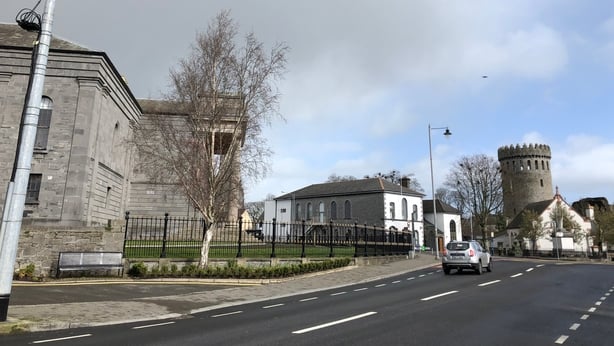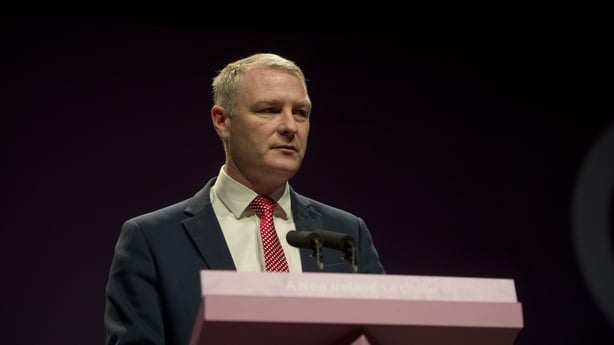Tens of thousands of court summonses are backlogged in the Irish court system, according to new figures obtained by RTÉ's Morning Ireland.
The figures show 66,000 summonses - legal documents that subpoena people to court for road, drug, public order, assault and other offences - are being processed and waiting to be listed in courts, compared to 13,000 in a normal year pre-pandemic.
The backlog represents a 46% reduction since October 2020 when the backlog of summons hit a high point of 122,000.
"The build-up of summons applications reached close to 122,000 at the height of restrictions, as more applications were being received than could be scheduled. Substantial inroads into the summons backlog have now been made and it has been reduced to 66,000 the number of summonses awaiting a listing date. This is a halving of the numbers awaiting scheduling during Covid," the Courts Service said.
"Excellent progress has been made, with backlogs broadly gone for most of the country with the exception of some problems in high density urban areas such as Dublin. Extra sittings were arranged over the Christmas and Easter vacations for the past two years to deal with Covid backlogs," added the spokesperson.
The majority of backlogged summonses - 45,000 - are in Dublin.
The Courts Service is planning to use courtrooms freed up during this Easter when the Circuit, Central and Special Criminal Courts are not sitting and courtrooms are available to reduce the backlog.
The backlog relates to delays caused by the pandemic and because "extra courtroom capacity" is a challenge in Dublin.
There are over 4,800 summonses listed for April 2023 which was agreed between the President of the District Court, Courts Service and An Garda Síochána.

"Extra courtroom capacity remains a big problem in Dublin but we are looking at ways to free up some capacity, such as: additional sittings were added to reduce the backlog last January, and we also have more scheduled for Easter when Circuit, Central, and Special Criminal courts are not sitting and courtrooms are available. We also undertook this exercise last Easter," said the spokesperson.
Matthew de Courcy, a partner with KOD Lyons and a family and criminal solicitor in Dublin, said the issue relates to resources.
"There needs to be a significant number of additional judges appointed to process and to service the existing caseload," he said.
Mr de Courcy added that the resource issue related to the Courts Service, An Garda Síochána and the judiciary and that "a more integrated approach needs to be taken" with Government stepping up resources appropriately.
We need your consent to load this rte-player contentWe use rte-player to manage extra content that can set cookies on your device and collect data about your activity. Please review their details and accept them to load the content.Manage Preferences
"The Courts Service and the President of the District Court are continuing to work together to reduce this backlog and the appointment of eight additional District Court judges as recommended in the recent Judicial Planning Working Group report will assist greatly in this matter.
"President Kelly has identified the clearing of any remaining backlogs as a priority when new judges are appointed," added the spokesperson.
Other backlogs are being experienced in Dundalk (5,714), Trim (4,550), Nenagh (2,449) and Cork (2,183).
The backlogs in these areas relate to population density, increases in population in recent years and capacity, according to the Courts Service.
Senior Counsel and Associate Professor of Law at NUI Galway Tom O'Malley said the backlog of 66,000 summonses show court resources have not kept pace with population increases.
"What these numbers probably illustrate is that the resources available to the courts probably haven't kept pace with increases in population.
"As well as that, with district courts being combined with smaller courts and moved to bigger court centres … there may be a certain degree of efficiency in that … but that does of course add to the backlog.
"It's a welcome development that the Government is proposing to appoint more than 20 new judges this year. But of course, it's also important that the backup resources be provided, because having judges isn't enough," said Mr O’Malley.
He added an impact of the summonses backlog is "unfairness".
"There’s an element of unfairness to it, especially when you have minor offenses of that nature where people are entitled to know as soon as possible or to have a decision as soon as possible.
"There is after all in this country, a constitutional right to trial with reasonable speed or reasonable expedition. And it's for that very reason that it’s unfair to leave somebody waiting," said Mr O’Malley.
David Peters, a solicitor in Nenagh Co Tipperary, said the backlog in his district relates to the combination and centralisation of courts in the district.
"We lost local courts such as Borrisokane, Roscrea and Newport, which would traditionally have their own court sittings and court lists. These were all amalgamated into Nenagh District Court area in recent years, which has inevitably increased the workload for the Nenagh Court office.

He told Morning Ireland about the impact on defendants, gardaí, solicitors and the local court.
"It's borderline unacceptable at this stage, the length of time it is taking to clear the list on a daily basis. I myself was present at Nenagh District Court up to 7.20pm last Friday evening as the judge worked really hard to work through her long list for that day.
"Many of the people that were left at the end of the list had extremely important matters that needed to be dealt with and had been waiting around since 10.30am.
Mr Peters said: "A lot of the defendants in these cases would unfortunately be people that suffer from drug addiction issues or alcohol addiction issues and that for them, in particular, to have to wait around in the precincts of the courthouse for their case to be called for six or seven hours, is less than ideal.
"In addition, you have many gardaí whose time has been taken up by virtue of the fact that they have to wait until their case is dealt with for a similar number of hours. Obviously, that has knock on effects for the ability of those guards to carry out their other duties either back in the station or out on the beat or on the streets."
He added: "It's also very difficult for the court staff themselves because they are required to work extra-long hours. That's not tenable if it continues into the future."
Sinn Féin Spokesperson on Justice Martin Kenny said the summons backlog relates to "under resourcing" and "a hangover" from the pandemic "when a large number of cases" were adjourned.

"It's clearly under resourcing and it's a hangover from Covid when we had very large numbers of cases that were adjourned. I'm surprised that it's so high still, and I think clearly what we need to see here is a re-emphasis on getting additional personnel and court hearings speeded up and moving along because delayed justice is denied justice for many people.
"And while some of these may be minor enough incidents, traffic incidents or minor assaults or whatever, some of them can be quite serious, and any case that's held up for too long is a huge shadow over people involved. It's also a worry and concern for people on both sides of it. The Courts Service need to put in the resources in order to deal with this more effectively and efficiently," said Mr Kenny.
The Department of Justice said in a statement it "is a priority for the minister to ensure that the courts are resourced to administer justice efficiently and effectively for citizens".
"Minister for Justice Simon Harris last month secured Government approval to dramatically increase the number of judges to facilitate greater access to justice, to clear Covid backlogs and to support the Government’s priorities to establish a Planning and Environmental Court and dedicated Family Courts.
"The minister intends to appoint an initial tranche of 24 new judges in 2023, with a further 20 new judges following the implementation of reforms and efficiencies," a Department of Justice statement read.
The Courts Service said the limitations to scheduling includes courtroom capacity, service by gardaí of summonses, and the capacity of gardaí, judges and Courts Service staff to service additional courts, and these are kept under constant review.
An Garda Síochána said in a statement it had established a Summons Service Oversight Group chaired by the Assistant Commissioner of Roads Policing and Community Engagement.
This group accepts a finding in the Commission of Future of Policing in Ireland report which recommended "summons service is not a function that should sit within An Garda Síochána".







